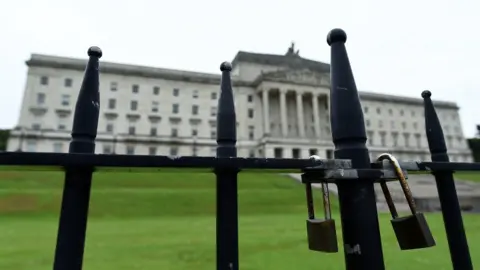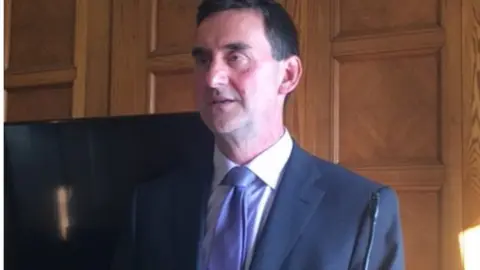Stormont departments face £1bn pressures next year
 Reuters
ReutersStormont departments are understood to be facing spending pressures of up to £1bn in the next financial year.
Pressures do not necessarily mean cuts of the same amount, as funds can be reallocated between departments, or planned polices can be delayed.
On current projections, Stormont's block grant for day-to-day spending is due to fall by almost 2% in real terms in 2018/19 and a further 3% in 2019/20.
The Department of Finance said an incoming executive will make decisions.
It is possible the financial position could improve slightly following November's budget.
The funding package the DUP agreed with the Conservatives can only partly mitigate the funding pressures, as it is weighted towards capital spending.
At most, £310m of it could be used for day-to-day to spending over the next two years, mainly in health and education.
Increasing faster
Pressures refer to a situation in which demand for services is increasing faster than the available budget.
The single largest spending pressure, of £400m, is in health.
Other pressures include education £200m, skills £50m, housing maintenance £25m and public transport £10m.
There are additional pressures of £100m related to the Historical Institutional Abuse Inquiry.
If devolved government returns and the parties implement a lower level of corporation tax, that will cost an estimated £250m in its first year.
Any increase in public sector pay would also add to financial pressure: Every 1% increase would add about £60m to the salaries bill.

Last week, the most senior official in the Department of Education said his department was facing pressures due to rising pay, special educational needs and maintenance costs.
Speaking to school principals and MLAs at Stormont recently, Derek Baker said: "It is a very difficult space that I'm in financially."
Department of Finance officials have long warned that Stormont budgets at the end of this decade would be tough.
Stormont's annual budget is just £10bn for day-to-day spending, and around £1bn for capital spending.
'Information gathering'
A Department of Finance spokesperson said it had "commissioned an information-gathering exercise to collect the necessary data that will allow a future executive to make key, informed decisions on a budget for 2018-19 and beyond".
"It will be for an incoming executive to make decisions about funding levels and final budgets."
Northern Ireland has effectively been without a devolved government since January.
Its institutions collapsed amid a bitter row between the DUP and Sinn Féin about a botched green energy scheme.
Subsequent talks failed to reach an agreement.
